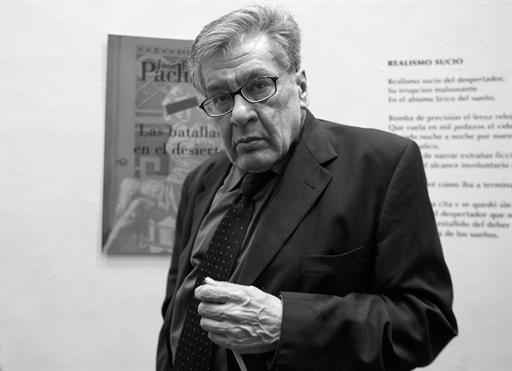Biography
José Emilio Pacheco was born in 1939 in Mexico City. Influenced by his father, Pacheco began studies in law at Mexico’s national university (UNAM) but soon switched to philosophy and literature. Recognized as one of Mexico’s most significant writers of the twentieth century, Pacheco wrote poetry, novels, essays, plays, short stories, and literary criticism. He also authored more than 20 book-length translations of English-language authors into Spanish.
Pacheco’s poetic debut, Los elementos de la noche (1963, The Elements of the Night), was followed by El reposo del fuego (1966, The Resting Place of Fire), No me preguntes cómo pasa el tiempo (1969, Don’t Ask Me How the Time Goes By), Islas a la deriva (1976, Islands Adrift), and Los trabajos del mar (1983, The Works of the Sea), among others.
Initially, his poetry was characterized by surrealist, abstract images, but with time he adopted a more direct, unadorned idiom. Themes such as life, death, and the fleeting nature of time are also present in his work, reinforcing his belief that history is a series of intermittent events that besiege mankind. Concerned about the social and physical conditions of his native Mexico City, notorious at some point as one of the world's most populated and polluted cities, Pacheco broached issues such as pollution, poverty, governmental bureaucracy and the disregard for indigenous people in his poetry. In a minatory tone, poems such as "Malpaís" and "Paseo de la Reforma" (Tarde o temprano: Poemas 1958-2009) ponder the effects of pollution on the atmosphere, the landscape, and the life of trees.
On a different front, Pacheco was also particularly attuned to the world of animals. Works such as Album de zoología (An Ark for the Next Millennium), writes Randy Malamud, constitute “of the most extensive treatments of animals by any modern poet, and one of the most sensitive and ambitious attempts to […] approach to animals on their own terms—representing their authentic existence and consciousness.” In a way that connects with the pre-Columbian indigenous belief in “animal souls” or tonalismo, several poems in his volume Album de zoología (translated as An Ark for the Next Millennium) evince the mutuality and interdependence of human and animal destinies. Malamud goes on to observe that “Pacheco's use of animals […] represents an ideal endpoint on the continuum of an animal-based—and animal-centered—aesthetic.”
In 2009, Pacheco won the highest award given to a Spanish-speaking writer, the Cervantes Prize. Pacheco was also awarded nearly 24 other literary prizes, notably, the Mexican National Poetry Prize in 1969, the Octavio Paz Prize in 2003, the Pablo Neruda Iberoamerican Poetry Prize in 2004, and Spain's Queen Sofía Iberoamerican Poetry Prize in 2009.
José Emilio Pacheco died of a hear attack on January 26, 2014, in Mexico City.


